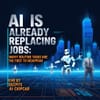Artificial intelligence (AI) is no longer just a futuristic concept—it’s actively reshaping the workforce today. New research reveals that AI is already making a significant impact on jobs, with routine tasks being the first to go. As AI continues to evolve, it’s clear that automation is playing a crucial role in transforming industries, and the effects on workers are starting to be felt.
According to the research, jobs that rely on repetitive, predictable tasks are most vulnerable to automation. Roles that involve tasks like data entry, scheduling, and basic customer service are increasingly being handled by AI systems, leaving workers in these positions at risk of displacement. These routine jobs are often the easiest for AI to replicate because they follow set patterns and require little to no creative input, making them ideal for automation technologies like machine learning and robotic process automation.
However, this shift isn’t just about job loss. The impact of AI on routine tasks also offers an opportunity for workers to focus on more creative, strategic, and interpersonal aspects of their roles. While AI can take over repetitive tasks, human workers still excel in areas that require empathy, innovation, and complex problem-solving. As automation takes over the mundane, employees could be freed up to take on more rewarding and intellectually stimulating work, potentially increasing job satisfaction and productivity.
At the same time, the transition isn’t without challenges. Many workers in industries like retail, manufacturing, and administrative support face uncertainty as AI systems become more capable. The skills that were once in demand for routine tasks are rapidly becoming obsolete, and workers may need to retrain or shift careers to stay competitive. This shift underscores the importance of upskilling and education to help workers adapt to the changing landscape. As AI continues to advance, providing resources for reskilling will be key to ensuring that workers are not left behind.
In industries like healthcare, finance, and even education, AI’s impact is also being felt. While some jobs are at risk of automation, others are being transformed. For example, AI-powered diagnostic tools are assisting doctors in identifying diseases more accurately, while automated financial systems are handling tasks like risk analysis and portfolio management. These changes highlight the potential for AI to augment human capabilities rather than simply replace workers entirely.
The growing presence of AI in the workforce is a reminder of the ongoing need for careful planning and policy-making. Governments, businesses, and workers must work together to navigate this transition, ensuring that the benefits of AI are maximized while the negative impacts on workers are mitigated. This means creating policies that encourage responsible AI deployment, investing in worker retraining programs, and addressing the social and economic challenges that come with a rapidly changing job market.


